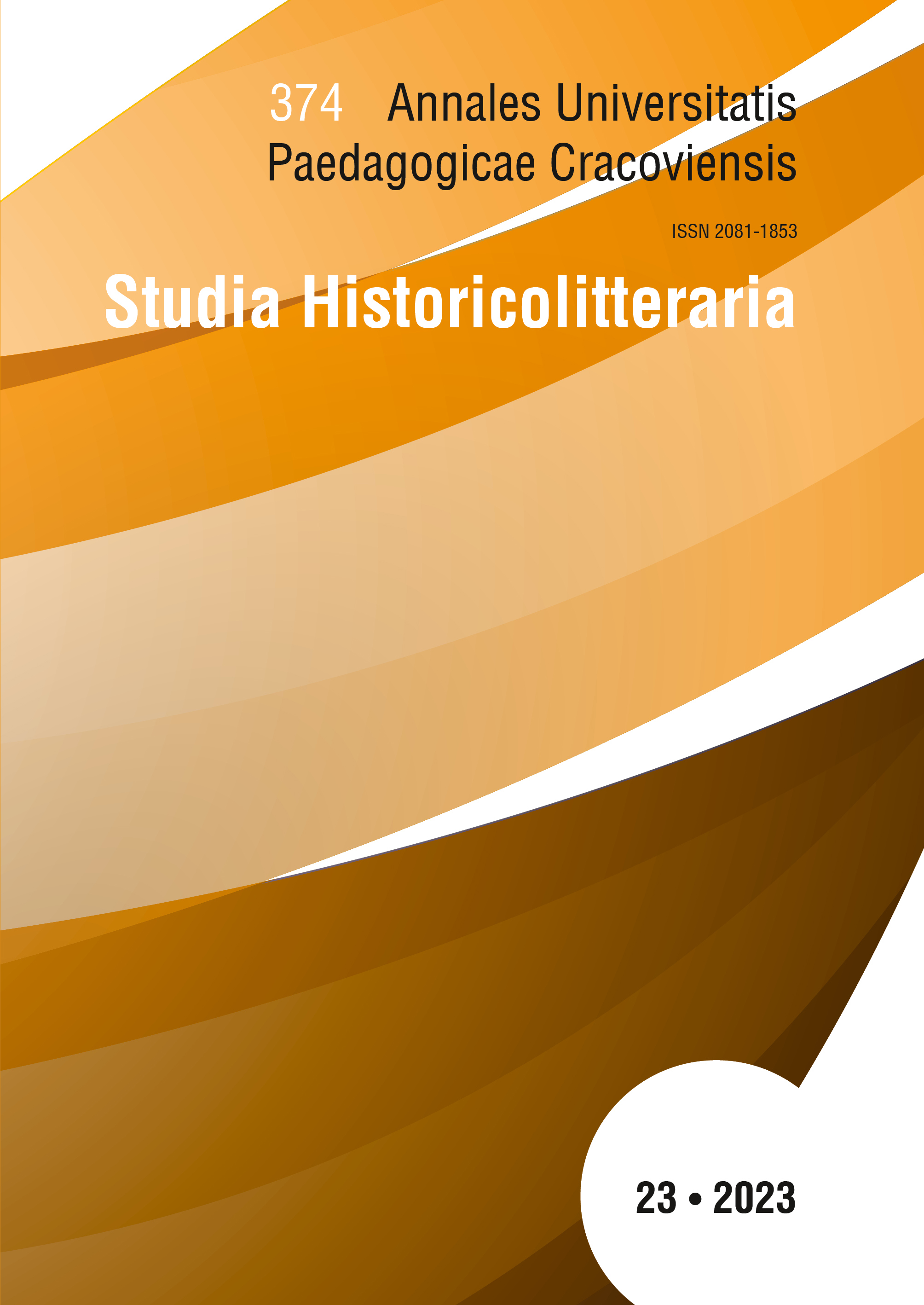Constructing oneself in a story – about history and identity in "Dom kata" ("The Hangman’s House") by Andrea Tompa
Main Article Content
Abstract
The main purpose of the article is to present the literary output of Andrea Tompa, using her debut collection entitled Dom kata as an example. In her work, the Hungarian writer uses her creative potential connected with the experiences of growing up in a discriminated national minority in Romania in the 1980s. In the paper, I demonstrate how the history of the area and biography intertwine in the literary transformation of experience in a quasi‑autobiographical story about entering adulthood. In Andrea Tompa’s work, one can see how the geo‑cultural experience has an impact on both the way the story is constructed and the narrative strategies applied, as well as its influence on the reception of the work among readers. The trauma of the regime and exclusion associated with Romania in the second half of the 20th century is conveyed by means of a hybrid form and fragmented narratives. This unique combination that makes up the book of the Hungarian writer provides an inspiring material for literary research, both from the perspective of memory studies and the poetics of experience. As for the way of constructing the story, which is hard to categorize according to strict genre classifications, it only enlivens the reception.
Downloads
Article Details

This work is licensed under a Creative Commons Attribution-NonCommercial-NoDerivatives 4.0 International License.
COPYRIGHT POLICY
The publisher of "Annales Universitatis Paedagogicae Cracoviensis.Studia Historicolitteraria" is authorised to use and distribute all the materials published in the journal on the basis of a non-exclusive licence agreement unlimited in time – previously concluded for an indefinite period of time each time with the author of a specific paper in the fields of exploitation specified in the agreement.
OPEN ACCESS POLICY
"Annales Universitatis Paedagogicae Cracoviensis.Studia Historicolitteraria” is an open access journal, and all its contents are available for free to users and/or their institutions on the basis of non-exclusive licenses under Creative Commons (CC BY CC-BY-4.0). Users can read, download, make copies, distribute, print, search, or to link to full text articles in this journal without the prior permission of the publisher or the author.This is consistent with the definition of open access BOAI (http://www.soros.org/openaccess).
References
Assmann A., Cztery formy pamięci, przeł. K. Sidowska, [w:] tejże, Między historią a pamięcią. Antologia, red. M. Saryusz‑Wolska, Warszawa 2013, s. 39–57.
Assmann A., Przestrzenie pamięci. Formy i przemiany pamięci kulturowej, przeł. P. Przybyła, [w:] Pamięć zbiorowa i kulturowa. Współczesna perspektywa niemiecka, red. M. Saryusz‑Wolska, Kraków 2009, s. 101–142.
Assmann J., Pamięć zbiorowa i tożsamość kulturowa, przeł. S. Dyroff, R. Żytyniec, „Borussia” 2003, nr 29, s. 16.
Czermińska M., Trójkąt autobiograficzny. Świadectwo, wyznanie i wyzwanie, Kraków 2000.
Faragó K., A viszonosság alakzatai, Újvidék, 2009.
Hejmej A., Komparatystyka. Studia literackie – studia kulturowe, Kraków 2013.
Kulturowa teoria literatury. Główne pojęcia i problemy, red. M.P. Markowski, R. Nycz, Kraków 2006.
Kunz T., Więcej niż słowa. Literatura jako forma istnienia, Kraków 2019.
Łebkowska A, Empatia. O literackich narracjach przełomu XX i XXI wieku, Kraków 2008.
Łebkowska A., Fikcja jako możliwość. Z przemian prozy XX wieku, Kraków 1998.
Nęcka A., Emigracje intymne: o współczesnych polskich narracjach autobiograficznych, Katowice 2013.
Nieszczerzewska M., Narracje miejskiej wyobraźni, Poznań 2009.
Nycz R., Poetyka doświadczenia. Teoria – nowoczesność – literatura, Warszawa 2012.
Pekaniec A., Dlaczego (auto)biografie? Literatura dokumentu osobistego kiedyś i dziś, „Autobiografia. Literatura. Kultura. Media” 2022, nr 1, s. 125–144.
Rybicka E., Geopoetyka. Przestrzeń i miejsce we współczesnych teoriach i praktykach literackich, Kraków 2020.
Rybicka E., Miejsce, pamięć, literatura (w perspektywie geopoetyki), „Teksty Drugie” 2008, nr 1–2, s. 19–32.
Tabaszewska J., Od literatury jako medium pamięci do poetyki pamięci, „Pamiętnik Literacki” 2013, z. 4, s. 53–72.
Tompa A., Dom kata, przeł. A. Butrym, Wrocław 2016.
